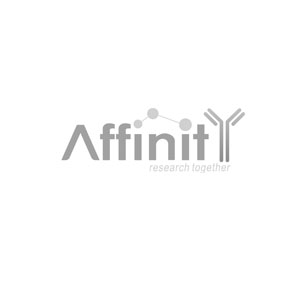BRI3B Antibody - #DF3376
| Product: | BRI3B Antibody |
| Catalog: | DF3376 |
| Description: | Rabbit polyclonal antibody to BRI3B |
| Application: | WB IHC IF/ICC |
| Reactivity: | Human, Mouse |
| Prediction: | Pig, Bovine |
| Mol.Wt.: | 27 KD; 28kD(Calculated). |
| Uniprot: | Q8WY22 |
| RRID: | AB_2835758 |
Product Info
*The optimal dilutions should be determined by the end user.
*Tips:
WB: For western blot detection of denatured protein samples. IHC: For immunohistochemical detection of paraffin sections (IHC-p) or frozen sections (IHC-f) of tissue samples. IF/ICC: For immunofluorescence detection of cell samples. ELISA(peptide): For ELISA detection of antigenic peptide.
Cite Format: Affinity Biosciences Cat# DF3376, RRID:AB_2835758.
Fold/Unfold
BNAS1; BRI3 binding protein; BRI3-binding protein; BRI3B_HUMAN; Bri3bp; Cervical cancer 1 proto oncogene binding protein KG19; Cervical cancer 1 proto-oncogene-binding protein KG19; cervical cancer oncogene binding protein; HCCR-2; HCCR1; HCCRBP-1; I3 binding protein; I3-binding protein; KG19;
Immunogens
Most abundantly expressed in brain, liver and kidney (PubMed:11860200). Overexpressed in leukemia and lymphoma cell lines, as well as in various carcinomas (PubMed:17943721).
- Q8WY22 BRI3B_HUMAN:
- Protein BLAST With
- NCBI/
- ExPASy/
- Uniprot
MGARASGGPLARAGLLLLLLLLLLLGLLAPGAQGARGRGGAEKNSYRRTVNTFSQSVSSLFGEDNVRAAQKFLARLTERFVLGVDMFVETLWKVWTELLDVLGLDVSNLSQYFSPASVSSSPARALLLVGVVLLAYWFLSLTLGFTFSVLHVVFGRFFWIVRVVLFSMSCVYILHKYEGEPENAVLPLCFVVAVYFMTGPMGFYWRSSPSGPSNPSNPSVEEKLEHLEKQVRLLNIRLNRVLESLDRSKDK
Predictions
Score>80(red) has high confidence and is suggested to be used for WB detection. *The prediction model is mainly based on the alignment of immunogen sequences, the results are for reference only, not as the basis of quality assurance.
High(score>80) Medium(80>score>50) Low(score<50) No confidence
PTMs - Q8WY22 As Substrate
| Site | PTM Type | Enzyme | Source |
|---|---|---|---|
| T49 | Phosphorylation | Uniprot | |
| K71 | Ubiquitination | Uniprot | |
| K229 | Acetylation | Uniprot | |
| K229 | Ubiquitination | Uniprot | |
| S248 | Phosphorylation | Uniprot |
Research Backgrounds
Involved in tumorigenesis and may function by stabilizing p53/TP53.
Mitochondrion outer membrane>Multi-pass membrane protein.
Most abundantly expressed in brain, liver and kidney. Overexpressed in leukemia and lymphoma cell lines, as well as in various carcinomas.
Interacts with LETMD1. Interacts with BRI3.
Restrictive clause
Affinity Biosciences tests all products strictly. Citations are provided as a resource for additional applications that have not been validated by Affinity Biosciences. Please choose the appropriate format for each application and consult Materials and Methods sections for additional details about the use of any product in these publications.
For Research Use Only.
Not for use in diagnostic or therapeutic procedures. Not for resale. Not for distribution without written consent. Affinity Biosciences will not be held responsible for patent infringement or other violations that may occur with the use of our products. Affinity Biosciences, Affinity Biosciences Logo and all other trademarks are the property of Affinity Biosciences LTD.
